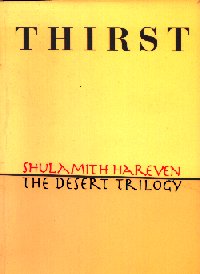





|
I ordered this book from Amazon because I had been impressed by the author's short story, "My Straw Chairs" included in The Oxford Book Of Hebrew Short Stories. My Straw Chairs is set in the here and now of Israel, written in the first person, autobiographical style, from the viewpoint of a mature female Academic, a woman such as the author herself, of whom the Oxford Book Of Hebrew Short Stories has this to say:
And in Thirst, The Desert Trilogy, the cosmopolitan woman living in modern-day Jerusalem writes of biblical prophets in the desert, yet we never meet Moses himself, nor his inner cabinet. Instead the three novellas in the trilogy , The Miracle Hater, Prophet, and After Childhood deal with the bewildered communities who followed them for forty long years, becoming steadily more removed from their origins, more uncertain about their futures, and more alienated from their traditional ways and from each other.
The wandering has been long and tedious. The original emigrants, once so full of confidence, so imbued with the spirit, now barely remember the reasons for their exodus , while for their children, and their children's children, the details of the bright new life promised to them have become a little- believed mythology. Moses has become a remote, legendary figure, and the laws handed to him have become overworked and unworkable, misquoted and misinterpreted- and, by some, periodically, deliberately, ignored as they begin to doubt the power of this God they follow.
They wander, bewildered, lost, unmotivated, unmethodical, gradually scattering, the varied origins of the many clans and tribes accentuating their differences until they are less than cooperating kith and kin and closer to quarrelsome, distrustful neighbours. Nor is the desert of their wanderings the barren, unpopulated place the Bible would have us believe. Other groups and individuals are encountered by the emigrants- other, inhospitable folk not following this new ONE God, and , while some would learn of Him, some would challenge Him and some would mock. And there are wars, and cities besieged and destroyed and abandoned and resettled. And, all the time, some still wander, and in their bewildered wandering, with always the doubting, the questioning, the uncertainty, and the new horizon forever receding, there is the threat that the old roots will be left to wither, until it seems that only kinship and GROUP and family have any meaning. And gradually the reader comes to realise that these are the tenets the wanderers must grasp, and clasp, and preserve at all costs, so that the traditional rituals that keep the old ways alive in memory will become the bridge between the old world and the new world promised to them, that world which so many of these pilgrims, and those who follow, will never see. This is an enjoyable book, beautifully written , its readability uncompromised by the awareness of translation, since Shulamith Hareven worked with the translater, Hillel Halkin, to recreate the narrative, which flows as smoothly as the desert sands themselves.
And whether you want to read it to find out about how Jewish people think, and a little of "why", I can recommend Thirst, The Desert Trilogy
If your taste is for the kind of insightful writing women seem able to produce, you will enjoy Thirst!
And if you hunger for "Food For Thought", Shulamith Hareven has set a banquet before you!
And if you just want "a good read", with no ulterior motive at all, this Desert Trilogywill not disappoint.
|
Want To Check Out Price And Availability of the most readily available edition?
 |


 Reactions, Comments and suggestions to: robink@datafast.net.au
Reactions, Comments and suggestions to: robink@datafast.net.au